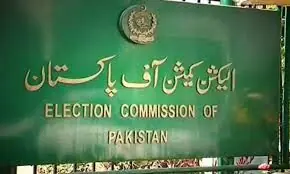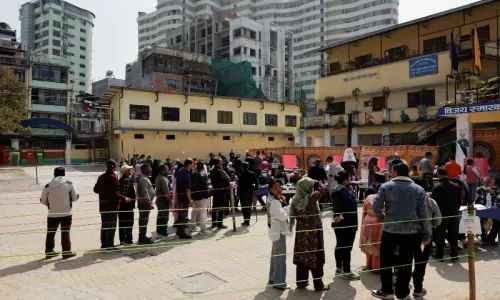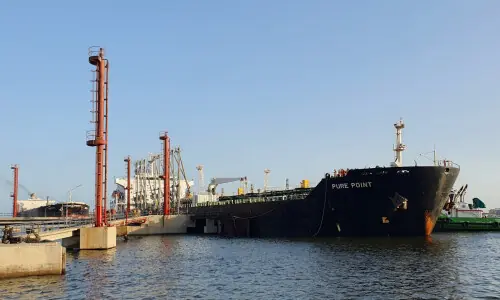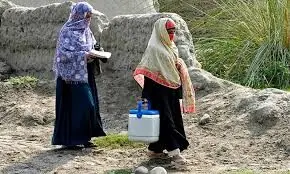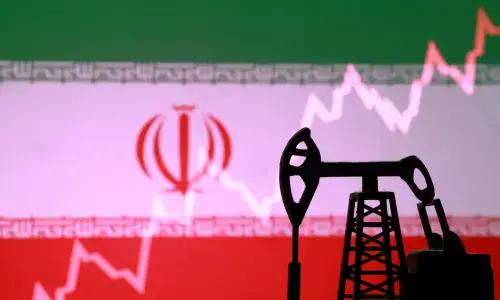For Pakistani women, the deck is stacked against them in the spheres of politics and governance, both of which have traditionally been considered as jobs for men. Ahead of Women’s Day on March 8, meet eight remarkable Pakistani women making a mark in these two domains. Each of these women is simultaneously a leading lady and a survivor — their sheer hard work and brilliance has opened up new avenues and spaces for debate and discussion for other women, but it has come on occasion at great personal cost to them
Ayesha Mumtaz: Punjab’s big cheese

After regulating scores of Lahore eateries and food outlets under certain hygiene standards and regulations, Punjab Food Authority (PFA) Director (Operations) Ayesha Mumtaz is now after beverage, mineral water and catering companies, milk sellers and marriage halls these days. ‘Thou shalt not adulterate’ is her motto and Punjab has been in love with her interventions.
Mumtaz is a Grade-18 officer from the provincial management service (PMS, Ex-PCS). She had joined the PFA on June 1, 2015, after Punjab’s food secretary requisitioned her service from the Services and General Administration Department. Soon after assuming charge, she went into campaign mode and launched her crackdown.
“Before joining the PFA, I worked as a district officer in the city district government. When I joined, there were murmurs about how a woman officer couldn’t possibly work at a position that apparently necessitated a man to do the job — dealing with issues of bus and truck terminals, mobs, clashes and so on.”
Mumtaz persevered regardless; she claims she did her best to regulate the bus and truck terminals besides forcing passengers and goods transporters to follow the rules. But her new posting in the PFA brought the best out of her.
“I am basically a field-oriented officer and always like to have postings where I can go out into the field,” she explains. Since her seniors were well aware of her uncompromising nature, they gave her free rein to launch her drive against food establishments.
“I launched the campaign on June 15 last year by starting it from the very basics, such as cleanliness of a meal or a table where food is ought to be served,” she narrates. Mumtaz claims that PFA’s vigorous campaign has so far taken action against 15,381 hotels and restaurants, 988 marriage halls, 6,595 sweets bakers, 579 food producing units and 35,348 other premises. These actions include sealing of 3,025 premises besides arrest of 386 people under 179 cases registered against them.
Then there were 114,432 litres of unhygienic milk and thousands of kilograms of substandard commodities such as red chilli powder, tea and other sorts of expired food items that were seized and discarded. As a result of the drive, the owners of 12,700 eateries have thus far received licenses after getting their businesses registered with the PFA.
Mumtaz says that she has recently diverted focus from eateries to other food businesses, keeping in view the public interest. “Though we will continue visiting eateries side by side, we are now mainly focusing on our anti-adulteration drive these days. Under this, we are penalising those involved in adulteration of milk, water, powders, beverages, wedding halls, caterers etc,” she says.
Asked why she didn’t inspect food businesses in the limits of cantonment boards, she said she wanted to do it, but the legal hitches made her unable to do so.
“Actually under the law, the cantonment boards are supposed to deal with such issues on their own within their territorial limits. And the city governments, PFA etc cannot perform such jobs in the areas falling within limits of cantonment boards. That is why we cannot do this,” she argues.
The matter has been taken up with cantonment boards’ administration, she explains, on account of increasing complaints related to hygiene. A number of food companies have shifted their production units to areas within the jurisdiction of cantonment boards, limits since they know that the PFA wouldn’t be able to touch them there.
Mumtaz believes that officials without courage and integrity can never work in the best interest of the public at large. “I think you have to have energy to put someone on their toes. If you have this energy and courage, you can overcome all odds,” she says.
Having been awarded an appreciation shield from Punjab Chief Minister Shahbaz Sharif, Mumtaz says the secret to her success is not falling to the mediocrity of routine.
“Officials fond of routine work can never serve people in an impressive manner. I think you must distinguish yourself through your work by maintaining impartiality in the implementation of law,” Mumtaz concludes.
Akeela Naz: Voice of landless peasant women
by Shafiq Butt
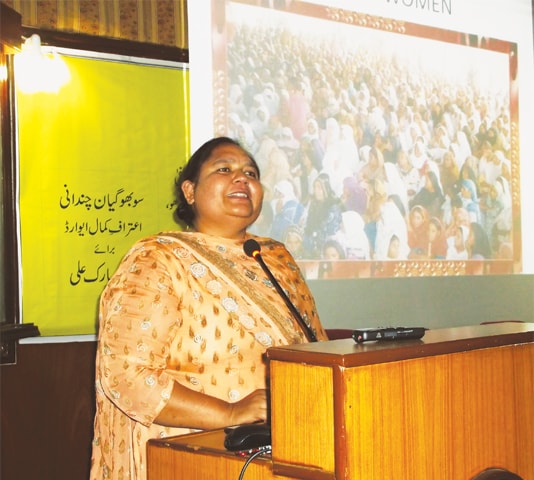
When Akeela Naz entered the struggle of the Anjuman Mazareen Punjab (AMP) back in 2001 as a 22-year-old woman, little did she know that the movement of landless peasants will consume her life in the years to come. In a struggle that started about 15 years ago, she has grown from a confident, young woman into a seasoned leader of women peasants.
The AMP had many men who’d go on and stake claim to leadership, but when it came to women, there were only a handful willing to do the hard yards. Naz’s efforts helped shape landless women peasants into a visible force that could stand up to the might of the State and rebuff their efforts to evict landless peasants from military farms in Punjab.
“I call myself a companion of landless farming women,” says Naz, explaining that she avoids the use of the phrase “political activist” to define or introduce herself. Naz is the recipient of the “Meeto Memorial Award” instituted by Delhi based feminist leader Kamla Bhasin. The award was offered to a new generation of social activists from South Asia and Naz received award in 2010, in Bangladesh. She served as finance secretary of the AMP from 2008 to 2011, and is now an executive member of the AMP.
Naz’s inspiration to work with landless farmers is her father, Samual Rahmat. Her ancestors tilled land for centuries but were not declared owners of land allocated to them in village 87/10-R by the British in 1880. Her great grandfather, Rahmat, settled in Ariya Nager presently located in seven villages of district Khanewal. That was the time when the British were developing the canal system and brought settlers from Eastern Punjab for cultivation. She was later inspired by AMP co-founder Dr Christopher John’s commitment when he formed “Jag Jawan” and “Jag Kisan” movement in District Khenwal.
Among the AMP higher leadership, a protocol was developed by landless farmers: the chairman will be a man and the president a woman. Women had a 44pc share in the provincial higher set up. This was to encourage more women to step forward, but ultimately, it was their men colleagues who disappointed.
“I still remember after our Khanewal Long March in 2010, when the Punjab government negotiated with AMP, many of our senior colleagues showed resistance in negotiating under women’s leadership. This tendency dominated in the next few years, eventually leading to all of AMP’s provincial level women bodies becoming dysfunctional,” she explains.
“Presently, we have an organisational set up for women at district level but they have no voice in the AMP’s provincial set-up. Regretfully, this undermined our role as activists,” she says.
After spending 15 years in the movement, she now feels dismayed by the “chauvinistic tendencies” of her men counterparts in the AMP and the wider Left in Punjab. To cherish her vision and dream, now she is heading her organisation named the Peasant Women Society (PWS).
Through the PWS, Naz is advocating permanent legislation for women ownership whenever any land reform is carried out in future. She is presently struggling to improve legislation that ensures joint land ownership between men and women, including provisions for a defined wage structure for women labourers tilling the land.
“About 50pc of the informal agriculture labour force is women,” she explains, adding that the cause of landless peasant women cannot be strengthened until women are empowered through land ownership deeds. She demands separate seats of landless women in three tiers of local government — metropolitan, municipal corporation, and union council levels.
But how will the AMP be revived?
“There is a need to reorganise women’s strength in central decision making processes, where they once enjoyed more than 40 pc decision-making power. In the last three to four years, higher decision-making forums have become redundant. This is not what my women colleagues or I wanted for the movement,” explains Naz.
Naz is very critical while analyzing the role of Left-oriented political parties in the AMP movement during and after their 2010 long march. She claims these parties failed to educate and create an organisational hierarchy. “Developing ideological bases is the work of political parties and we didn’t manage to do that,” she explains.
And yet, Naz believes that her struggle needs to continue because landless farmers among 10 districts Punjab are still deprived of ownership rights of 70,000-acre agricultural land.
Lubna Tiwana: Call of duty
by Sadia Khatri

In 1994, Karachi was a place of gory violence: targeted violence, torture cells, kidnappings, and sexual violence would define and dictate the city’s politics and policing. In such troubled times, Lubna Tiwana was posted as a station house officer (SHO) in one of the city’s most troubled localities, Malir. In the 22 years since, she has been a pillar of support for women in distress as well as those who aspire to be policewomen.
Fifty-year-old Lubna Tiwana first joined the police force as an inspector in 1994; there were fewer women in the police force but Tiwana’s family was supportive. She was posted at the Women’s Police Station in Saddar and soon after transferred to the Malir Police Station (PS) as a SHO. Here, the then-30-year old jumped headfirst into handling women’s troubles and filing cases on domestic affairs.
“Solving family matters is difficult,” Tiwana says. On the one hand, the women’s police station proved to be an important support system for women who were in trouble or seeking help. “Women can easily talk to other women,” Tiwana says. But that alone was not enough.
Many cases involved a criminal who belonged to the same family, or was the complainant’s father or husband. Then the job comes with its own challenges.
“Problems for women are almost obligatory,” Tiwana says. For one, working alongside men isn’t easy, especially in an environment where one has to constantly interact with criminals. “Male police officers adopt a certain manner,” Tiwana says, citing countless occasions of men using filthy, crude language around women — often as an attempt to make them feel uncomfortable. “It becomes a way [for men] to threaten and harass women. Thana culture is difficult for women.”
Then, there are hardly any accommodations made for women’s daily troubles. No transport is provided for women to travel back and forth, even when they work late hours for days on end. Married women like Tiwana have to leave their children and familial duties at home to manage their job, but unlike their male counterparts, they have the added pressure of balancing the two worlds.
“In accordance with the policy, we get three months of maternity leave,” Tiwana explains. “But after the three months, women are forced to leave their kids at home. They can’t give enough time to work because their attention is at home; they can’t take off either because they have to do a job.”
Tiwana’s life might be a bit more organised now — she gets to work at 9am, and tries to leave by 5pm — but it is in no way less hectic. As the Federal Investigation Agency’s assistant director for international departures at the Jinnah International Airport, Tiwana says she deals with all kinds of people. It isn’t a problem for her; in her 15 years of working with the FIA alone, she has served under several of its wings, including the anti-human trafficking wing, the anti-corruption wing, the corporate crime wing, and the immigration wing, where she is currently posted.
She laughs when asked about the various awards she’s been awarded over the years. “Awards come and go,” she says, “When a case is successful… that’s when I’m really happy; when a victim gets justice and a criminal is thrown into jail.”
But her time on duty has taught her that successful cases require more than simply doing the job right. Once a case is filed, a simple intervention from an influential figure or out of court proceedings that rely on pressure and bribery can destroy all the hard work put in by the police. Tracking the criminal down is only the first step.
Tiwana remembers a murder case from a while ago which involved a domestic worker hired by a renowned TV anchor. The worker’s daughter had teamed up with her husband to kill his first wife. They first cut her hair, then threw acid on her, then burnt her till she was no more. After a lot of difficulty, Tiwana managed to track down the criminal couple. Justice could have been served, but then the anchor intervened himself — he showed up at the station and got the arrested couple released.
“It’s exhausting,” Lubna says. “We do all this work, and a simple sifaarish disturbs everything.”
But then there are other cases, where justice is served. During her time as an SHO at the women’s police station, Lubna remembers a 17-year-old girl who was brought in by a male policeman. The girl had attempted suicide but was safe. After talking to her and trying to get her to call home, Lubna discovered that the girl was being abused at home by her father-in-law.
In another case, a police inspector was found complicit in kidnapping his step-daughter and raping her. Lubna not only recovered the girl, but also registered an FIR against the police inspector and got him arrested.
“When the accused gets a sentence, I consider it a huge achievement,” Lubna says. She relates a case of child trafficking she is particularly proud of resolving: an eight-month-old child was kidnapped from Saudi Arabia and was brought to Pakistan in the lap of a woman. Tracking the woman and the child down was difficult because their documents were forged, but when she finally made it happen, Lubna lodged an FIR and called up the child’s parents in Saudi Arabia. He was safely reunited with his parents.
Nafisa Shah: Breaching ‘honour’
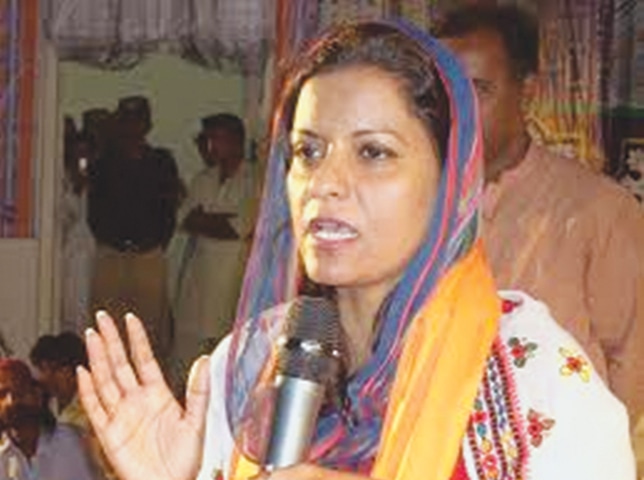
In 2001, as Sindh went to vote for General Pervez Musharraf’s local government system, an intellectual leader emerged from Khairpur in the PPP: Nafisa Shah.
“There were only two women nazims across Pakistan — myself and Faryal Talpur. During that time, I did some social work in education, got some two-room schools constructed at a cost of Rs250,000 each, made citizen committee boards, gave common people some money and they came up with committee schemes.”
Nafisa is a current member of the National Assembly and vice president of the Commonwealth Parliamentary Association. During 2008–2013, Shah served as chair of the National Commission for Human Development, general secretary of the Women’s Parliamentary Caucus, and a member of parliamentary standing committees on finance, minorities, economic affairs and statistics.
But arguably, it is her work on honour killings in Khairpur that has been disruptive and groundbreaking. Although her research work started in her tenure as nazim, she spent a decade conducting fieldwork and completed her doctoral thesis “Honour Violence, Law and Power: A Case Study of Karo Kari in Upper Sindh” in 2010 at the University of Oxford. She is the only parliamentarian to have completed her doctorate from Oxford while still a member. Her book on the topic is under publication.
“My research is something that was a personal interest which grew out of journalism. I was at Newsline with Razia Bhatti, who I consider her my mentor and she guided me in the world of journalism. I received an APNS award on the groundbreaking research on honour killings in 1993; it was the first story on honour-based violence in rural Sindh.”
Indeed, such is the scope and breadth of her work that her family background is more of an afterthought. Her father, Qaim Ali Shah, is the incumbent Sindh chief minister but has little sway in his daughter’s decisions. In fact, Nafisa takes great pride in how her parents brought them up.
“My mother always thought that girls must not be behind boys in education; they must get the same kind of education if not better and just for this reason she moved from Khairpur to Karachi because she said that if my boys can study in good schools, my girls should also study in good schools,” she says.
“My father is a self-made, hard working person who believes in ideological politics. After the emergence of the PPP, he joined the party because it was a socialist party. He was a small town lawyer and helped the people and that’s why he became popular. We have small land. My family is what one would call middle class in rural area,” says Nafisa.
“From an early age we were made to realise that whatever we have to do we have to do ourselves; we were never made to realise that we have some entitlement or were privileged, even when our father was a minister in Bhutto’s cabinet.
“I grew up during the Gen Ziaul Haq’s era when the PPP and the entire political process came under the crackdown and my father went underground. We developed that instinct of survival that we have to survive on our own hard work. We don’t have that feudal mindset that we have landed property and so we don’t have to do anything. We have all worked hard to be what we are today.
Nafisa enjoyed a good rapport with Benazir Bhutto, who had always wanted her to join the party. “She was in touch with me and we used to discuss different topics and I used to work for her when I was at Oxford.” Benazir later asked her to contest election for nazim in her home district and subsequently, she was elected as the Khairpur nazim in 2001.
“Because of our political training to work against the status quo and work for rights, and being a part of the women’s caucus we did a lot of work on rights-based legislation,” she explains.
“It is very unfortunate that when we enact laws for things that are our women’s natural right as per our Constitution, it is criticised,” she says of the recent protection of women law.
“In my research I have seen that a lot of violence against women happens in the family. So if there is a troubled family, the state cannot sit idle and say that because in our values we do not intervene in family affairs, therefore let the women continue suffering. That is something that we cannot allow. I think there is a long way to go, we have made these enactment but we are very far from enforcing them.”
In Nafisa Shah’s view, in Pakistan we have some great role models such as Malala, Shermeen Obaid, Razia Bhatti and Benazir Bhutto and they have struggled for every inch of the way, but a lot more still needs to be done: “I don’t think that women in Pakistan have had an easy sail. I think women of Pakistan have moved far; but unfortunately, there is still a long way to go.”
The former Khairpur nazim argues that women’s rights cannot be separated from larger rights struggle. “When we talk of women’s rights the same women are more likely to talk about injustice if it takes place against children, against labour, against farmers, against youth, because women’s rights agenda is basically a rights agenda.”
But while the cause of women has been furthered with increased legislation and activism on gender-based issues, the road to freedom is still long and is laced with impediments.
“We never get it on a plate. If we think we will get our rights on a plate we are mistaken; we have to work for it. I think people like myself who are privileged in the sense that we have access to corridors of power, still have not done enough in mainstreaming women.”
Nusrat Ara: Mardan’s Apa
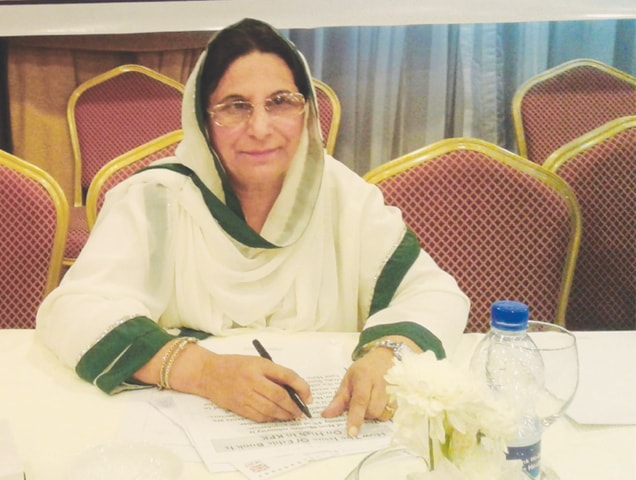
Nusrat Ara is lovingly called ‘Aapa’ (elder sister) by women of her locality in Mardan district of Khyber Pakhtunkhwa, where she has been working since the past three decades or so. Despite hailing from a conservative, middle-class family, Nusrat Ara has made it possible for many rural women from Khyber Pakhtunkhwa to speak up for their economic and political rights.
“I have been threatened, I have been harassed. During my provincial election campaign in 2013, some would ask me how much I would pay them for their vote, others would make me feel weird by questioning my ability to represent them in the provincial assembly since I was a woman,” says Nusrat Ara, a modestly dressed woman in her 50s, while sharing her experience as a contestant in the previous elections.
Having contested and won local government elections thrice from Mardan — in 2001, 2005 and 2015 — Nusrat Ara could have chosen to remain just another councillor. But in her activism, she has punched over and above the political ceiling that had been defined for her. Despite threats to her life, Nusrat travels in cramped wagons and dingy rickshaws to reach out to rural women on issues relating to their skill development, economic and political awareness.
Even peasant men, whom she had trained on seeds and fertilisers, look up to her with much respect. It was Nusrat Ara who had been convincing them to contest in local government elections on seats reserved for peasant men and women. And although her experience of canvassing for votes ahead of provincial assembly polls in 2013 taught her many bitter lessons, Nusrat Ara believes that women, such as herself, who hail from humble background and have some awareness about their rights, have a long way to go to get their rightful place in social, economic and political life.
Nusrat has been dealing with her ordeals on two fronts. The first is a personal battle: going against her family’s strict customs was never going to be easy but Nusrat found her husband to be supportive. But he was unable to provide for the family all on his own, so she decided to take up a teaching job and even set up a small school.
“I remember how once I had no money to buy milk for my infant daughter. I have not forgotten how I travelled 20km every day in public transport to teach at a school and faced harassment en route,” recalls Nusrat Ara, even though she still travels by public transport.
Nusrat and her husband wanted to give their four daughters a better life, so both worked tirelessly and did not care for how their family cut ties off with them. They were forced to move to Mardan in 1987.
The other battle was braving the resistance on a social front. As she had started to meet women in her locality and set up a women development organisation in 1995, not many looked too kindly upon what she was doing.
“I remember it was quite hard to talk to rural women about their rights when they were illiterate and lacked confidence in themselves,” describes Nusrat Ara.
She soon set up skill development projects to help women earn their livelihood while not having to challenge their immediate cultural norms. And yet, some local clergy issued negative remarks about her from the local mosque.
“They would say, ‘This woman is working on a Western agenda.’ I received threats but some locals advocated for me and took my side,” she recalls, sharing how she faced resistance when she held a community meeting about human rights in Shamshadabad village of Mardan.
Although a bit easier, social acceptance was still not that easy even when Nusrat was elected as a councillor in 2001 and then again a district councillor in 2005.
As an active district councillor, Nusrat monitored schools, detected ghost schools and schemes which often landed her in trouble with the local influentials ending up in life threats to her. Yet she was adamant to take part in the general elections in 2013 from a constituency (PK-24) where the Nawab and Khans of Mardan district were exerting all kinds of social pressure, running elections campaigns much beyond the limits allowed by the Election Commission of Pakistan.
While the other candidates put their wealth on display and their workers pasted posters and ran active campaigns, Nusrat Ara would go alone, in a rickshaw, from one house to another to request citizens to vote for her. However, she knew the voters had placed a price for their valuable votes, which she could not afford.
“I knew I had no chance of winning since other contestants had strong political and financial backgrounds. Yet, I wanted everyone to know that politics is not inheritance right of the rich alone. Anyone can contest,” she says.
Although she lost provincial elections, Nusrat Ara was later elected as a district councillor in Mardan during the last local government elections.
Although Nusrat Ara had been working with South Asia Partnership (SAP) on advocacy in Charsadda district, she was forced to shut the office due to security threats as some women in the non-governmental sector had recently been targeted.
However, she continues to be part of a programme called AWAZ, which is creating awareness among the people about their civic rights and responsibilities.
Bushra Gohar: Shattering Pakhtun stereotypes

It is not just her silver pixie hairdo or her confident demeanour that makes her stand out: Bushra Gohar, or BG as her friends call her, also dispels the myth about Pakhtun women as weak, oppressed, illiterate, slaves of norms and customs.
Gohar had proved her mettle in development sector long ago before actively engaging in politics. She joined a progressive nationalist party, the Awami National Party (ANP), at a time when each and every member of the party, from the top to the grassroots levels, was targeted by militants who despised women in public life. Yet she appeared on television channels and spoke openly about issues concerning Khyber Pakhtunkhwa and the tribal areas.
Although BG comes from a political, noble and educated family of Jhanda in Swabi district, she, like many other women, also faced problems in following the life that she chose for herself. Once in an interview, BG disclosed that she was named Bushra or good news only because she was the fifth girl born to her parents, when everyone in the village was expecting and praying for it to be a baby boy.
“I have been a bit of a rebel and have always challenged status quo,” she once said in an interview.
Gohar had completed her master’s degree in human resource management abroad, and just when she was planning to pursue another degree in the US, she lost two of her sisters and a niece in a plane crash. She took upon herself, despite being single, to bring up four of her late sister’s children.
BG proved to be a woman of character when put to test in her family life but her political life too is glittered with achievements that her clan and party can be proud of.
Unlike many others who succumbed to temptations of money, power and glamour when in power, BG has stayed grounded in reality and remained a women rights’ activist as a parliamentarian too. She tried all she could to legislate on different crimes which deprived women of their due social, legal and political status in society.
Being chair of the Standing Committee on Women’s Development and as member of the Women Parliamentary Caucus, she was ahead of everyone in legislation on all the major issues raised on the floor of the NA. She worked on the law for institutional strengthening of the National Commission on the Status of Women.
“I had also worked on the ANP’s internal committee for 18th amendment and represented the party on the Parliamentary Committee for Constitutional Reforms, when either of the Party’s two full Committee members couldn’t attend the meetings,” says BG.
Gohar has been instrumental in lobbying for legislation on political rights of women, eliminating gender discrimination, domestic violence and acid throwing crimes as well as repeal of the blasphemy law. She also played a key role in the domestic violence and acid crimes legislation.
Although she is happy about some provinces having passed laws to protect women, the Khyber Pakthunkhwa assembly has been delaying such legislation on women issues.
She jointly submitted an amendment to the Political Parties Order to increase women’s representation in decision-making within their parties, and to create a minimum 10pc quota for women when parties award tickets for general elections. The bill couldn’t be passed in the last assembly but has been re-tabled.
“I had submitted a bill to amend the citizenship act to remove discrimination against women. This was debated at length in the Standing Committee on Interior. Committee members agreed the discrimination should be removed but the bill was blocked, citing security risks and delays in the bureaucratic procedures,” explains BG.
As Chair of Standing Committee on Women’s Development, BG had taken up a petition on sexual harassment of a woman pilot in PIA. The case was well documented and the Committee’s directions were accepted by the Supreme Court in the same case. It encouraged women to speak up about harassment. This was the beginning of many similar cases which were taken up later.
“I also feel the ECP’s decision to nullify the PK 95 by-polls is a step forward in our long struggle for women’s right to vote,” says BG as she shared her victories in politics.
She had taken up similar incidents in Shangla, Kohistan, Swabi and other districts in Pakhtunkhwa and rest of the country. “In the Shangla case, the ANP was the only party to remove several members at the district level for barring women from voting by entering into a written agreement,” she proudly says. — Sadia Qasim Shah
Saeeda Baloch: Begum among baboos
by Moniza Inam

Meeting Saeeda Baloch is an exhilarating experience as she unfolds her life in bits and pieces — a life full of struggles, hurdles and accomplishments. She is considered a role model for generations of female civil servants in Balochistan, as she was the first Baloch woman to pass Central Superior Service (CSS) examination in 1984 and joined Civil Services Academy when she was a mother of four young kids.
Saeeda Baloch is also credited with having broken the taboo in Balochistan around women joining the civil services. She proved with her competence that women officers could be as successful and accomplished as men.
When asked how she was able to achieve a feat which is considered as the ‘mother of all exams’ due to its meticulous standard, she replied that she had always been a good student. She credits the contribution of her late father, who was a knowledgeable person and served in the agriculture department as a director. He was a visionary who gave his daughters full freedom and opportunity to get educated, and later, to work in the public sphere. This was quite a revolutionary decision at the due to the tribal and conservative traditions of the province.
Baloch received her early education from Lady Sandeman School and graduated from the Government Girls College Quetta. She completed her master’s degree from the University of Balochistan in English Literature. She belonged to the first few batches of the newly established university.
After graduating with flying colours, she served in the small industries department as an assistant manager. She then joined the education department and was posted in Kalat Girls College as a lecturer. After three years, she was transferred to Government Girls Degree College Quetta Cantt.
However, the real change in her life came when she joined Civil Services Academy in 1984 and was assigned to the Audit and Accounts group. In the Academy, she proved her mettle in academics and extracurricular activities. When she joined the Accountant General’s (AG) office in Quetta, she was the only woman in a 500-plus staff.
When asked about her experience of serving in that atmosphere, she says that there was acceptability from her colleagues. Within no time, women from other departments who came to the AG office to clear their bills, started visiting her, specially widows and junior staff. Her reputation soon grew and many others reached her with their problems.
Over a period of time, many other women joined AG office on different positions; Baloch set up a ladies common room and prayers room for them and always encouraged them to study further to enhance their qualification and boost their promotion prospects. She also took some gender friendly measures and tried to control sexual harassment.
On her way up the ladder, she worked under different bosses and never faced any kind of discrimination except in one case. “One particular boss had a habit of calling meetings late in the afternoon, which usually lasted up to two hours. I’d feel immensely uncomfortable as my kids would be waiting for me at home,” she narrates.
As a single parent, Baloch’s life has been a constant struggle to make ends meet. She has eight children, and her wish is to educate them into becoming professional and productive citizens.
Reheela Durrani: Custodian of Balochistan
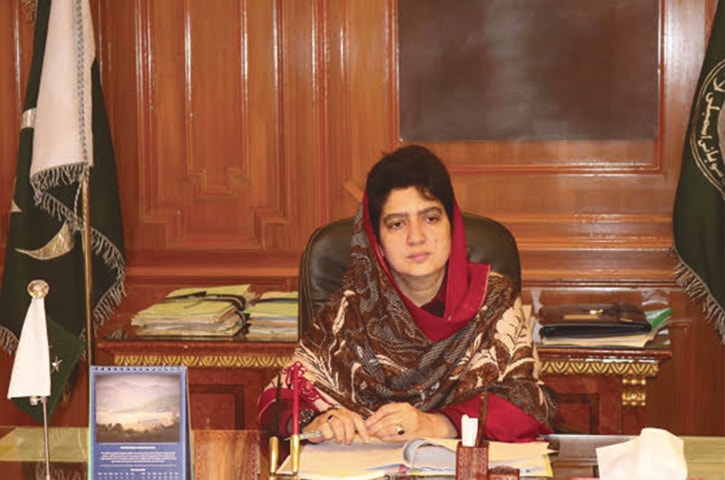
She never dreamt of becoming the speaker of a provincial assembly, but the announcement of her name for Speaker of the Balochistan Assembly took many established politicians by surprise — Raheela Hameed Khan Durrani neither belongs to a tribal chieftain’s family nor does she exert any special political influence in any party in Balochistan.
But as of December 24, 2015, Raheela Durrani is the custodian of the Balochistan Assembly, a job that is far removed from her work as a journalist, lawyer, human rights and women rights activist.
“It is one of the biggest examples of women empowerment that I was elected unopposed as Speaker Balochistan Assembly,” argues Durrani.
Balochistan politics has had a tradition of political influence being wielded by tribal chieftains, with women largely barred from playing a central role in politics. In a province where women are even deprived of their inherited rights of property, Durrani took oath as the first woman speaker of the province.
“I attribute all of my success and achievements to my mother and it was she who supported and encouraged me in every field of my life,” she says.
Durrani did not suddenly shoot to prominence; there is a history of struggle and sacrifice that she went through. She received her masters’ degree in journalism from the University of Balochistan and started her career as a journalist by working in leading Urdu dailies. In the day, she’d go to the university to take media school classes, and in the evening, she’d go and take classes at the Law College Quetta. After completing L.L.B and L.L.M, she also started working as a professional lawyer, specially fighting for the rights of oppressed women.
“I practiced for 10 years as a professional lawyer and during my career as an advocate, I did not charge money for 80pc cases. Most of these cases pertained to issues and problems faced by women,” says Durrani. She recalls vividly how her colleagues used to say that she’d never become a good lawyer as she did not charge a fee.
“I worked for the poor, needy and oppressed women of the society and I was elected for the seat of president of the association for all Balochistan-based NGOs,” she says.
She was awarded Tamgha-i-Imtiaz in recognition of her services for resolution of women’s issues, women empowerment, struggle to end child labour, girls education and other social works. At the time, when she was working as a social worker and rights activist, she was never part of mainstream politics.
“One day, in the year 2000, Jam Yousuf, then provincial chief of Pakistan Muslim League (PML)-Q came to my house and invited me to join his party. I accepted the request, and after some time, I was also elected as the provincial general secretary for the women’s wing of the party,” she narrates.
In the 2002 general elections, she was elected to the provincial assembly on a reserved seat for women. This paved the way for her in mainstream politics.
Several women’s welfare projects were completed under her gaze, including schools, girls colleges, universities, hospitals and social welfare institutions. “Since 2002, I have been allocating all development funds provided to MPAs for projects related to women, education and children’s welfare,” she declares.
Published in Dawn, Sunday Magazine, March 6th, 2016
















